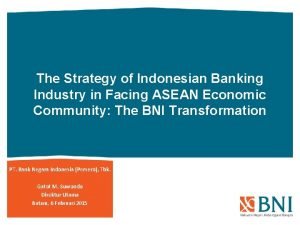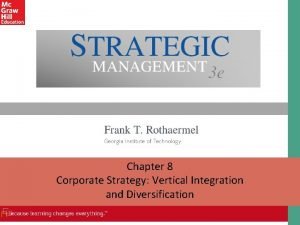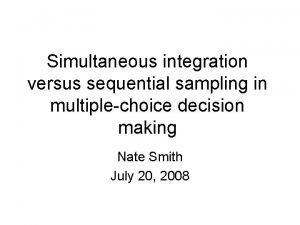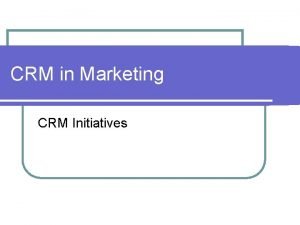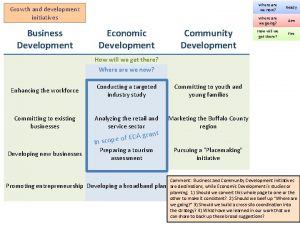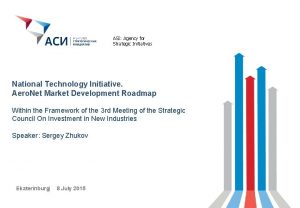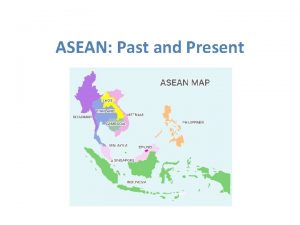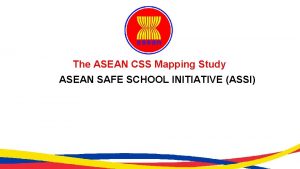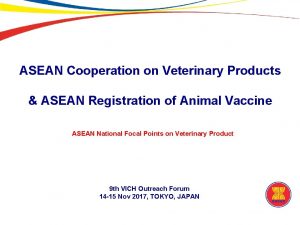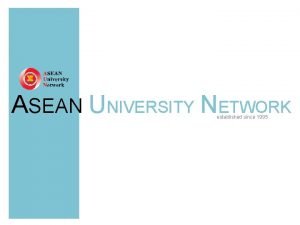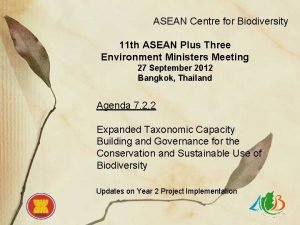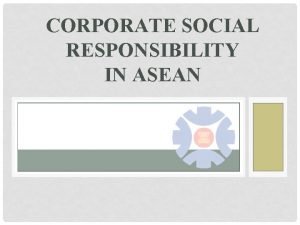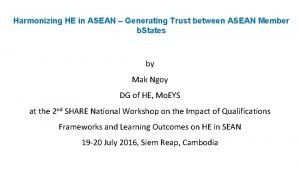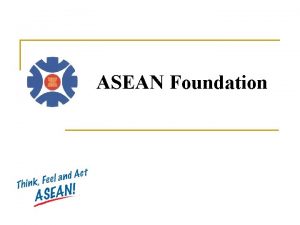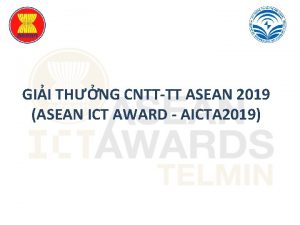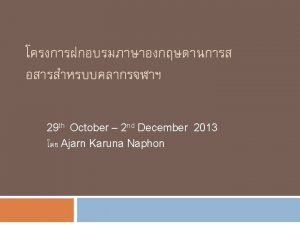Initiatives on Monitoring ASEAN Integration and the ASEAN



















- Slides: 19

Initiatives on Monitoring ASEAN Integration and the ASEAN Community Progress Monitoring System (ACPMS) Dr Melanie Milo ASEAN Integration Monitoring Office ASEAN Secretariat High-Level Seminar on ACSS Strategic Plan 2016 -2020 Bogor, Indonesia, 17 -18 June 2014

The Mandate o Blueprints: o ASEC shall monitor and review the implementation of the Blueprints o ASEC shall develop and adopt indicators and systems to monitor and assess the progress of implementation o Mid-term review to be undertaken when necessary

ASEC Monitoring Tools Goal / Impact Intermediate Outcome Immediate Outcome Output Activity Input ASCC Result/ General Outcome Sectoral based level Monito outcomes ring system ASCC Scorecard AEC Cross Sector AEC High-Impact indicators A C P M S ASR AFIR AISR AIMR AIS ATSR Compliance/ Implementation Monitoring system ASCC Blueprint Implementati on Monitoring System AEC Scorecard MDG

o Who is monitoring the AEC AIMO Blueprint? o o o Input, Activity, and Output level: AEC Scorecard Outcome and Impact: AEC High Impact Indicators Outcome: Monitoring and Surveillance Report o ASEANstats o ERIA o o o Studies to Further Improve the AEC Scorecard (2010, 2011, 2012, 2014) Focused on key areas Questionnaires and surveys

Key Mandate of AIMO Ø Ø Ø Establishment of ASEAN Integration Monitoring Office (AIMO) in 2010 by the ASEAN Finance Ministers Key mandate: strengthen regional economic surveillance and monitoring of the AEC to support the integration process AIMO also serves as the policy support unit of the AEC Department within ASEC, with support from the Statistical Division (ASEANstats)

How does AIMO monitor the AEC? ØMonitor the compliance of AEC commitments through the AEC Scorecard ASEAN ECONOMIC COMMUNITY

How does AIMO monitor the AEC? Ø Development of monitoring reports and technical papers on various initiatives under the AEC

How does AIMO monitor the AEC? Ø Development of monitoring tools/indicators and databases on regional economic integration (e. g. , AEC high-impact indicators)

How does ASEANStats monitor the AEC? o ASEAN Community Statistical System (ACSS) o ASEAN Community Progress Monitoring System (ACPMS) and ASEAN Brief o Reports the General Outcomes of ASEAN integration initiatives, both under the AEC and ASCC o ACPMS 2007 and ASEAN Brief 2007 – first issue o ACPMS 2012 and ASEAN Brief 2012 – second issue

How does ASEANStats monitor the AEC? o Started with the ASEAN Base Line Report (ABR) in 2005 o Monitor the programme and initiatives under the Vientiane Action Programme (VAP) o Measuring progress at programme level o More than 300 indicators were introduced and base lines were setup o Difficulty in synthesizing the overall integration progress

How does ASEANStats monitor the AEC? o ACPMS 2007, first issue o Received support and commitment from then AHSOM (ACSS) o Published and disseminated to the public at the ASEAN Summit in Singapore, 2009 o Different focus o o o Reports the general outcomes of integration Mostly outcome indicators 46 indicators: 21 AEC indicators and 26 ASCC indicators

How does ASEANStats monitor the AEC? o ACPMS 2012, second issue o Published and disseminated to the public through a press release in 4 AMSs and ASEC o Broader framework o o Enhanced the Framework 57 indicators: 29 AEC indicators and 28 ASCC indicators

Framework: Monitoring the AEC Single market and production base • Free flow of goods • Free flow of services • Free flow of investment • Freer flow of capital • Free flow of skilled labour Income convergence; Productivity convergence; Intra-ASEAN tourism; Price convergence; Intra. ASEAN trade in goods; Tariff reduction; Trade facilitation; Intra-ASEAN trade in services; Services trade liberalization; Intra-ASEAN FDI; Corporate tax rate; Convergence in financial returns; Convergence in skilled labour wages. Competitive economic region Global competitiveness index; Technological capacity (science and tech graduates, R&D expenditures, researchers per population, telephone subscribers); Science & technical publications; Innovation (patent and trademark applications); Technological capability (high tech exports) Equitable economic development ASEAN 6: CLMV ratios of income per capita, intra. ASEAN trade, and intra-ASEAN FDI, Cost of business start up. Integration into the global economy Extra-ASEAN trade in goods, extra-ASEAN inward FDI, extra-ASEAN tourism arrivals

Framework: Monitoring ASCC Human development Social welfare and protection Social justice and rights Ensuring environmental sustainability • Education • Human resource and entrepreneurship • Poverty • Income distribution • Health HDI, education, literacy, school enrolment. Poverty, income inequality, life expectancy, child mortality, underweight children, government expenditure on health, incidence of diseases. Female employment-to-population ratio, youth employment-to-population ratio Carbon emission, CFC consumption, transboundary haze, extent of protected area and forest cover, access to improved drinking and sanitary facility. (not available) Building ASEAN Identity Narrowing the development gap ASEAN 6: CLMV gaps in income distribution, life expectancy, child mortality, literacy, school enrolment, educational attainment.

Example of ACPMS Indicators and the Rationale Single Market and Production Base • AEC 5. 3: Intra-industry trade – As economies become more integrated the value of intraindustry trade index would increase • AEC 7: Cost to export and import one container of goods (from World Bank’s Doing Business) – One important measure of facilitating the establishment of a single market is through trade facilitation. Trade facilitation should lead to a lower cost of exporting and importing goods

Example of ACPMS Indicators and the Rationale Single Market and Production Base • AEC 12: Convergence in interest rates – Real interest rates represent the real price of capital. As the capital markets of AMSs become more integrated, financial capital will flow more freely, and will be reflected in the tendency for the real interest rates to become more equal over time. • AEC 14: Convergence in government bond yields – With more integrated capital markets, there will be a tendency of a co-movement in AMSs government bond yields.

Way forward Ø AIMO is working towards developing a unified outcomes-based regional integration monitoring mechanism. – A brainstorming workshop was funded by the EU-ARISE on improving the current regional monitoring integration system last week. • Combination of international experts on regional integration monitoring mechanisms and the desk officers. – Other ongoing TAs – Anchor the preparation of the ASEAN Integration Report; accompanying volume to the ACPMS • Important to effectively communicate the AEC in the lead-up to 2015 • A critical element of the AEC post-2015 agenda in order to inform and guide the process towards deepening regional economic integration in the next 10 years (AEC 2025)

Data Requirements • With clear framework and rationale, data needs can be specifically defined: – Choice of indices/targets/indicators – Quantitative measures have to be specified in terms of key features, characteristics and data requirements • Data sources: not limited to primary sources (data that are already available in ASEAN Secretariat and collected from NSOs); include secondary sources (from multilateral organisations such as the World Bank, IMF, UNCTAD, OECD)

THANK YOU
 Asean banking integration framework
Asean banking integration framework Three dimensions of corporate strategy
Three dimensions of corporate strategy Make or buy continuum
Make or buy continuum Integration
Integration Delvic sanitation initiatives
Delvic sanitation initiatives Digital initiatives in higher education
Digital initiatives in higher education Crm initiatives
Crm initiatives How does johannes volkelt theory prevent discrimination
How does johannes volkelt theory prevent discrimination Business development initiatives
Business development initiatives People's initiatives
People's initiatives Nasa access management system (nams)
Nasa access management system (nams) Health initiatives
Health initiatives Help desk improvement plan
Help desk improvement plan Us soccer pdi
Us soccer pdi Global health initiatives meaning
Global health initiatives meaning Work life balance presentation
Work life balance presentation Faa strategic initiatives
Faa strategic initiatives Oakland affordable housing preservation initiatives
Oakland affordable housing preservation initiatives Health promotion initiatives pdhpe
Health promotion initiatives pdhpe Agency for strategic initiatives
Agency for strategic initiatives
